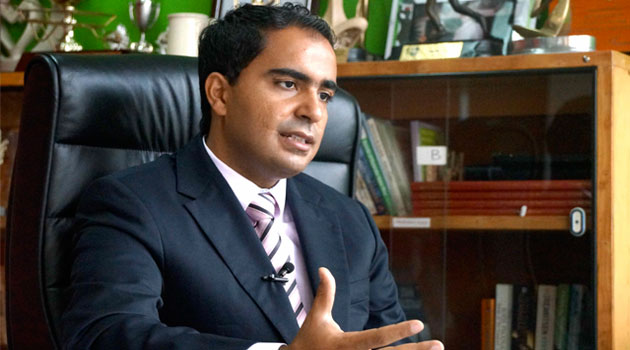
Meet the Chief Executive Officer of Airtel Kenya.
“I was born and brought up in Morocco, but I lived in France for 10 years where I did Engineering,” he begins.
NAIROBI, Kenya, May 29 – Adil El Youssefi greets me with a firm handshake, then moves on to appreciate the all-girl media crew that is conducting the interview.
“I am impressed with the work ethic of Capital FM. Girls are really doing well here,” he says, and adds, “as are the men”.
El Youssefi, a Moroccan, is everything a CEO is supposed to be and more. At around 5’6”, his navy suit makes a perfect mix with his crispy white shirt. His hair is most notable; gleaming black and almost unruly, just like the corporate world.
Meet the Chief Executive Officer of Airtel Kenya.
“I was born and brought up in Morocco, but I lived in France for 10 years where I did Engineering,” he begins.
After school, El Youssefi would then proceed into the world of Telcoms working for British Telecommunications in London and for Millicom where he held top positions in Ghana, Sri Lanka and Chad.
His experience at Millicom, which owns Tanzania’s Tigo, shaped him into a leader and imparted useful knowledge that he would need in heading Airtel Kenya.
But Kenya’s tough telecommunication industry proved to be more than what he had bargained for when he took up the CEO position a year ago.
This pushed him into getting his priorities right; “The first thing I did during the first few months was to understand the internal and external culture of the company. Internally, the staff did not have much motivation while externally there was a huge dominance problem whereby one company had taken the largest market share leaving others including Airtel to operate on losses.”
This however did not make him get cold feet.
“My personal goal, then and now, is to ensure that our 310 direct employees and 1,500 indirect employees are able to meet their personal and professional needs by working for us. More so, that our customers are able to get quality services from us as we strive to compensate our shareholders,” El Youssefi explains.
He and his team then went around the country to learn about their customers; to find out what they liked, why they liked what they liked and how Airtel could fill the gaps that they found.
Their first revelation was that Kenyans loved the Internet.
“Our research showed that more and more Kenyans were going online for personal and professional purposes. They did not want to be left behind, hence their strong need of constant and affordable Internet,” he explains.
Hence they launched Airtel UnlimiNET, a bundle connection that ensures their customers continue to use the Internet even when airtime runs out.
“Even though it has been in the market for just a few months, UnlimiNET bundles have been welcomed by many Kenyans. We have seen an increase in the number of our subscribers,” he explained.
The growth of subscribers was complimented by the Airtel Money Visa Card which was launched a year ago.
The debit card was launched in conjunction with Chase Bank and payment technology giant Visa. The card allows subscribers to pay for goods without having their mobile phones. Further, subscribers can use the card to pay for goods anywhere in the world.
The advantages of Airtel Money do not end there.
The mobile money transfer technology, which allows people to send money across all networks for free, is giving subscribers 25 percent bonus on any airtime bought on Airtel Money. The move has seen the number of Airtel money users steadily climb to reach three million.
Further, the network has had an additional two million subscribers in the last one year including the one million that came with the yu Mobile acquisition.
“The company has however faced a lot of challenges since its launch five years ago,” El Youssefi laments.
First, the problem of dominance has been an ugly head for the business.
Airtel, for instance, only makes Sh9 in every Sh100, while Safaricom makes a Sh88 of the revenue share.
The challenges continue to get worse.
Airtel Money has had to battle out with Safaricom’s M-PESA which commands over 95 percent of all mobile money transactions made in the country.
Customers are also on the company’s neck complaining about a weak network to which the don says; “It is difficult for us to keep on investing heavily while we continue to make little to no profits. However, we are investing Sh3 billion into the upgrade of our network.”
El Youssefi calls on to the government and regulators to do more to control the market, saying that customers need to be given an opportunity to make choices.
“The problem is that the dominant player is making all the profits which puts Airtel and other small players in a very difficult situation as it becomes hard to sustain ourselves. The dominant player, therefore continue to get stronger as they have the ability to invest more into their network,” he says.
A winning strategy
The second largest network in Africa and fourth in the world is however not giving up on Kenya.
Even though it is a business and profits are important, Airtel has a sense of responsibility to its subscribers as El Youssefi explains; “Just like a person feels responsible for taking care of their families, we are responsible for the millions of Airtel subscribers in the country and hence we are here to stay.”
El Youssefi is optimistic about Airtel’s future in Kenya saying that with continuous upgrade to which Sh3 billion will be spent, customers are set to benefit with better voice calls, faster and steadier data network among others.
El Youssefi freely talks to us about his life outside work. “I am a happily married man and a father to two daughters who are the best thing that a man could ask for,” he says.
He also confides to us about his love for tennis saying that if he had not followed the path he did, he would have probably become a tennis player, “or a coach, I would love to coach tennis players.” Does he pursue it during his free time? “Yes I do, I do not give up on the things I love, just like Airtel!”



































